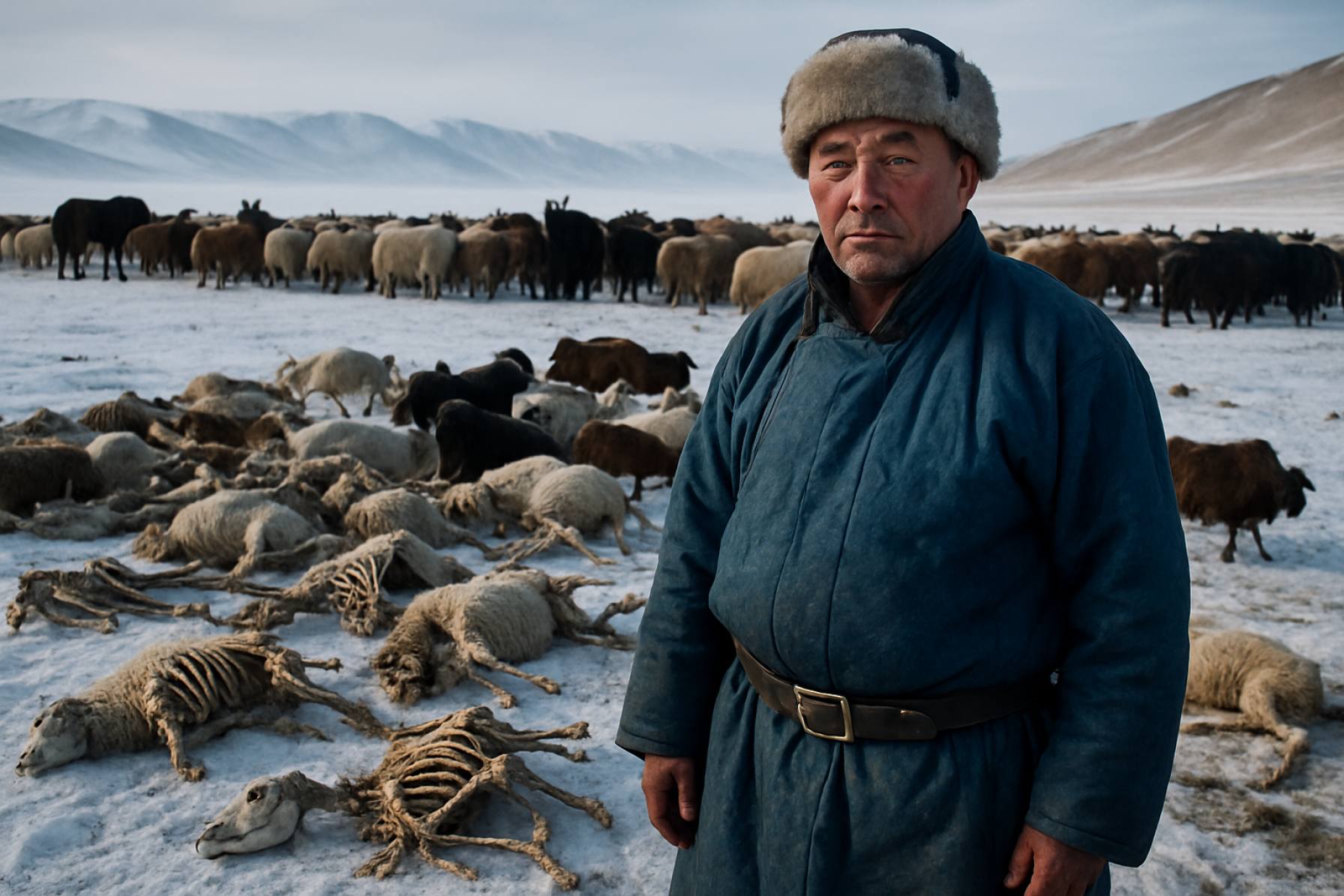Table of Contents
- Executive Summary: The State of Dzud Livestock Resilience Consulting in 2025
- Market Size and Growth Projections Through 2030
- Key Drivers: Climate Change, Policy, and Innovation
- Cutting-Edge Technologies: From Early Warning Systems to Smart Feeding Solutions
- Leading Companies and Industry Partnerships (Based on Official Industry Sources)
- Client Case Studies: Success Stories in Resilience Consulting
- Challenges and Barriers to Wider Adoption
- Regulatory Landscape and Government Initiatives
- Investment Trends and Funding Opportunities
- Future Outlook: What’s Next for Dzud Livestock Resilience Consulting?
- Sources & References
Executive Summary: The State of Dzud Livestock Resilience Consulting in 2025
In 2025, the field of Dzud Livestock Resilience Consulting is experiencing increased urgency and expansion, driven by the intensifying frequency of extreme winter events—dzuds—in Mongolia and neighboring Central Asian regions. Dzud, characterized by a combination of summer drought and harsh winter conditions, has led to significant livestock mortality, threatening pastoral livelihoods and national food security. The 2023-2024 dzud season was one of the most severe in decades, resulting in the loss of over 7.1 million animals, as reported by the United Nations Children's Fund (UNICEF). This crisis has catalyzed demand for specialized consulting services focused on building resilience among herder communities and their livestock assets.
Consulting firms and organizations active in Mongolia and Central Asia are now prioritizing data-driven risk assessment, climate-adaptive herd management, and integration of early warning systems. The Food and Agriculture Organization of the United Nations (FAO) has bolstered technical support for herder cooperatives, deploying digital platforms to deliver real-time weather and forage data, and advising on pre-emptive fodder storage and livestock insurance uptake. At the same time, the World Bank has expanded its collaborative programs with the Mongolian government to pilot scalable livestock insurance schemes and financial literacy training, aiming to cushion herders from economic shocks.
Innovation is a key theme for 2025. The International Federation of Red Cross and Red Crescent Societies (IFRC) is working alongside national and local partners to integrate resilience consulting with community-based disaster preparedness, including livestock vaccination campaigns and mobile veterinary clinics. Meanwhile, Mongolian entities such as the Ministry of Food, Agriculture and Light Industry are piloting digital advisory platforms and strengthening public-private partnerships to foster the uptake of climate-resilient livestock breeds and rotational grazing practices.
Looking ahead, the outlook for Dzud Livestock Resilience Consulting is shaped by ongoing climate volatility and international investment in adaptive solutions. Over the next few years, consulting services are expected to further embrace remote sensing, predictive analytics, and participatory knowledge transfer, with donors and multilateral agencies prioritizing sustainable impact and local capacity building. As the dzud threat persists, resilience consulting will remain central to safeguarding pastoral economies and supporting rural adaptation efforts in Mongolia and beyond.
Market Size and Growth Projections Through 2030
The market for Dzud Livestock Resilience Consulting is experiencing marked growth as climate volatility intensifies in Central and East Asia, especially Mongolia, where dzud events—devastating winters causing mass livestock mortality—are becoming more frequent and severe. As of 2025, industry stakeholders, including national governments, international organizations, and livestock insurance providers, are expanding investments in resilience consulting, focusing on risk management, early warning systems, and adaptation strategies for herders.
According to data from Food and Agriculture Organization of the United Nations, over 6.5 million livestock perished in Mongolia’s 2023-2024 dzud, underscoring the urgent need for specialized consulting services. In response, the Mongolian government, with support from organizations such as World Bank and Asian Development Bank, is scaling up initiatives to anticipate and mitigate future losses. These efforts include technical assistance, digital monitoring platforms, and community-based adaptation programs—services typically provided by resilience consulting firms.
Market size estimates for 2025 point to sustained growth. While precise consulting revenue figures are proprietary, the Mongolian National Reinsurance JSC and the Samsara livestock monitoring platform report rising demand for risk assessment, training, and technology integration among livestock-dependent communities. The World Bank’s Livestock Commercialization Project, for instance, is scaling up technical support and financial products for resilience, representing a multi-million-dollar consulting opportunity through 2030.
- Growth is further driven by donor-funded resilience programs, such as the International Fund for Agricultural Development’s initiatives, which are expected to inject additional capital and consulting opportunities into the sector over the next five years.
- Innovative insurance products, like the Index-Based Livestock Insurance (IBLI) supported by World Bank and Mongolian National Reinsurance JSC, are broadening the consulting market, requiring expertise in actuarial science, climate modeling, and digital outreach.
- By 2030, sector analysts anticipate continued annual growth, driven by climate adaptation mandates and increased integration of remote sensing and data analytics.
Looking forward, the market for Dzud Livestock Resilience Consulting is expected to expand steadily through 2030, fueled by climate risk, policy reforms, and the introduction of advanced technologies. As a result, providers of technical advisory, risk modeling, and digital solutions are poised for significant growth, particularly in Mongolia and neighboring countries facing similar climatic threats.
Key Drivers: Climate Change, Policy, and Innovation
The intensification of dzud events—severe Mongolian winters characterized by extreme cold, snow, and ice—has placed unprecedented pressure on the resilience of pastoral livestock systems in Mongolia and parts of Central Asia. In 2025, key drivers shaping the trajectory of dzud livestock resilience consulting are climate change, evolving policy frameworks, and technological innovation.
Climate change remains the foremost driver. According to the National Agency for Meteorology and Environmental Monitoring of Mongolia, the frequency and severity of dzud events have increased over the past decade, with winter 2023–2024 ranking among the harshest on record. Projections for 2025 and beyond suggest continued volatility, with above-average snowfall and longer cold spells anticipated. This ongoing risk has heightened demand for consulting services focused on risk assessment, herd management, and feed optimization.
Policy responses have also accelerated. The Mongolian government, in collaboration with international organizations such as the Food and Agriculture Organization of the United Nations (FAO), has expanded support programs for herders, including subsidized insurance schemes and emergency fodder reserves. In 2024, new regulations were introduced under the National Livestock Program to incentivize the adoption of climate-resilient practices and technologies, such as improved shelters and supplementary feeding systems. These policy shifts are creating significant opportunities for consultants with expertise in compliance, grant application, and implementation of best practices.
- Climate-resilient infrastructure consulting: The construction and retrofitting of livestock shelters, with improved insulation and ventilation, is emerging as a key area of demand. Companies like AGCO Corporation have reported increased inquiries from Mongolian livestock operators regarding durable shelter solutions and feed storage technologies suited to extreme climates.
- Digital innovation: Remote monitoring, weather forecasting, and decision-support tools are increasingly being adopted. The FAO and local partners are piloting digital mapping and early warning systems designed to alert herders to impending dzud risks.
- Insurance and risk management services: The AgroInsurance International platform reports that index-based livestock insurance products are expanding, driven by both private insurers and public initiatives, with consulting services needed to support herder enrollment and claims processes.
Looking ahead to 2025 and the years to follow, the outlook for dzud livestock resilience consulting is robust. The confluence of climate volatility, proactive government intervention, and rapid technological uptake is expected to further boost the demand for specialized expertise. Market participants and stakeholders should anticipate ongoing innovation and diversification in consulting offerings, particularly in digital risk management, infrastructure adaptation, and integrated policy compliance.
Cutting-Edge Technologies: From Early Warning Systems to Smart Feeding Solutions
In 2025, Dzud Livestock Resilience Consulting is leveraging cutting-edge technologies to help herders and livestock stakeholders in Mongolia and Central Asia confront the increasing frequency and severity of dzud events—extreme winter disasters characterized by cold, snow, and ice that impede livestock grazing and survival. The integration of early warning systems, precision monitoring, and smart feeding solutions is rapidly transforming resilience strategies, providing critical data-driven insights and actionable interventions.
Early warning systems are at the core of current resilience efforts. The National Agency for Meteorology and Environmental Monitoring of Mongolia (NAMEM) operates advanced remote sensing platforms and meteorological networks, issuing real-time alerts on weather anomalies and dzud risk levels. In 2025, NAMEM’s digital platforms are increasingly interoperable with mobile applications, allowing rapid dissemination of localized forecasts and risk advisories to herders, extension agents, and consulting partners. This immediacy enables proactive measures such as supplemental feeding, livestock movement, and shelter preparation.
Satellite-based pasture monitoring is another area seeing rapid deployment. Food and Agriculture Organization of the United Nations (FAO) initiatives now integrate high-resolution satellite imagery to assess pasture quality, snow cover, and forage availability. These datasets are crucial for consultants advising on sustainable stocking rates and early relocation strategies. In 2025, cloud-based analytics allow real-time integration of these data into advisory dashboards, supporting adaptive management at both household and regional levels.
Smart feeding solutions are also gaining traction, with consulting services increasingly recommending precision feeding technologies. Companies like Devenish and Cargill are supplying nutrient-balanced feed supplements tailored for cold-stressed livestock. Automated feeders and IoT-enabled feed inventory management systems, piloted in partnership with local cooperatives, optimize ration allocation and minimize wastage during critical periods. In 2025, these solutions are supported by mobile advisory tools, empowering herders to dynamically adjust feed strategies based on live animal health and weather data.
Looking ahead, the outlook is for further integration of artificial intelligence and machine learning into dzud resilience consulting. Predictive models will refine risk forecasts and optimize resource allocation, while continued expansion of digital infrastructure promises to reduce response times and losses. The combination of early warning, precision monitoring, and smart feeding technologies positions consulting services at the forefront of safeguarding Mongolia’s livestock sector against climate extremes.
Leading Companies and Industry Partnerships (Based on Official Industry Sources)
Dzud livestock resilience consulting has become a rapidly evolving sector, especially as dzud events—harsh Mongolian winters following summer droughts, leading to massive livestock losses—grow more frequent and severe due to climate change. In 2025, several leading companies and industry partnerships are at the forefront of developing and delivering tailored consulting services aimed at helping herders and agricultural stakeholders mitigate dzud risks and enhance livestock resilience.
One of the most prominent organizations in this space is the Food and Agriculture Organization of the United Nations (FAO), which collaborates with the Mongolian government and local herder groups to provide strategic guidance, early warning systems, and capacity-building workshops. Their ongoing projects include integrating remote sensing data for pasture monitoring, risk mapping, and advising on livestock management strategies to minimize dzud impacts.
The World Bank continues its leadership in supporting the Index-Based Livestock Insurance Project (IBLIP), which not only provides financial protection to herders but also incorporates extensive consulting and training components. These efforts focus on risk assessment, contingency planning, and sustainable grazing practices, with the aim of fortifying herder communities against escalating climate threats.
The Mongolian government, through the Ministry of Food, Agriculture and Light Industry, has formalized partnerships with both local and international consultants. These collaborations emphasize data-driven advisory services, such as the use of predictive analytics for dzud forecasting, and the design of livestock feeding and health interventions tailored to the unique ecological zones of Mongolia.
Private sector involvement is also on the rise. Companies like MicroInsurance Mongolia are expanding their consulting arms, offering risk mitigation workshops and digital advisory tools that integrate weather data, insurance products, and livestock management best practices. These services are often developed in partnership with international reinsurers and technology providers, promoting innovation in dzud resilience strategies.
Looking ahead, industry partnerships are expected to deepen, particularly as data sharing and joint pilot programs accelerate. Recent memorandums of understanding between Mongolian agencies and international bodies such as the Asian Development Bank signal a commitment to scaling up science-based consulting services and piloting novel resilience solutions. The outlook for 2025 and beyond suggests an increasingly integrated ecosystem, where government, development organizations, and private firms work collaboratively to transform dzud response and livestock sustainability.
Client Case Studies: Success Stories in Resilience Consulting
In 2025, Dzud livestock resilience consulting has become a critical service for herders and agricultural enterprises across Mongolia and Central Asia, where seasonal climate extremes threaten pastoral livelihoods. Recent years have seen a marked increase in dzud events—severe winter disasters characterized by heavy snow, extreme cold, and scarce grazing resources—prompting a surge in demand for specialized consulting focused on preparedness, mitigation, and sustainable adaptation.
A notable case is the collaboration between the Food and Agriculture Organization of the United Nations and local herding cooperatives in Arkhangai province. In early 2025, FAO consultants facilitated implementation of early warning systems and customized fodder storage solutions. As a result, participating households reported a livestock mortality reduction of over 40% compared to neighboring non-participant communities during the harshest winter months. This success hinged on data-driven advisories and real-time weather monitoring, demonstrating the impact of targeted resilience consulting.
Another case involved Asian Development Bank‘s ongoing technical assistance to Mongolia’s National Emergency Management Agency (NEMA). In 2024–2025, resilience consultants guided the rollout of community-based insurance schemes and mobile veterinary support units. Data collected by ADB and NEMA show that herders using these consulting-supported services experienced faster herd recovery and lower post-dzud indebtedness, strengthening community trust in proactive risk management models.
Private sector engagement has also expanded. World Bank initiatives, in partnership with Mongolian livestock insurers and agricultural extension services, have piloted digital advisory platforms for at-risk herders. In pilot programs launched in 2024 and scaled in 2025, over 8,000 herders accessed tailored resilience plans, including winter feed budgeting and animal health protocols. Early outcomes suggest a 15–20% improvement in livestock survival rates among users, with strong potential for expansion in the next three years.
Looking ahead, dzud resilience consulting is poised for further growth through integration with national climate adaptation strategies and advanced satellite monitoring. Experts anticipate increased investment in predictive analytics, participatory risk mapping, and digital extension services. As climate volatility persists, these consulting-driven interventions are expected to set new standards for safeguarding pastoral livelihoods across dzud-prone regions.
Challenges and Barriers to Wider Adoption
Dzud Livestock Resilience Consulting, focused on supporting herders and livestock operations to withstand Mongolia’s severe winter events (dzud), faces several persistent challenges that limit its broader adoption as of 2025 and into the coming years. These barriers are rooted in socioeconomic, infrastructural, and policy-related factors, each shaping the pace and effectiveness of resilience-building efforts.
- Limited Access to Timely Data and Forecasting Tools: Effective consulting hinges on accurate, up-to-date meteorological and pasture condition data. While agencies such as the National Agency for Meteorology and Environmental Monitoring of Mongolia have improved their early warning systems, many remote herding communities lack reliable internet and mobile connectivity, hampering real-time dissemination of forecasts and tailored advice.
- Financial Constraints for Herders: The up-front cost of resilience consulting services—including planning, livestock insurance advice, and implementation of risk mitigation measures—remains prohibitive for many small-scale herders. Despite the expansion of the State Fund for Agricultural Support of Mongolia and subsidized insurance programs, accessibility and awareness remain uneven, particularly outside major aimags.
- Capacity Gaps Among Local Consultants: There is a shortage of trained resilience consultants with deep knowledge of dzud dynamics and locally-relevant adaptation strategies. Initiatives led by organizations like the Food and Agriculture Organization of the United Nations have piloted community-based training, but scaling up remains slow due to limited funding and logistical hurdles in Mongolia’s vast steppe regions.
- Reluctance to Adopt New Practices: Traditional herding knowledge is invaluable, yet can sometimes conflict with external consulting recommendations, particularly around pasture rotation, supplemental feeding, or herd management strategies. Building trust and demonstrating the tangible benefits of resilience consulting is an ongoing challenge.
- Policy and Institutional Bottlenecks: Coordination among government agencies, donors, and service providers is often fragmented. While the Ministry of Food, Agriculture and Light Industry of Mongolia has prioritized dzud resilience in national strategies, implementation at the local level is uneven, with gaps in monitoring, evaluation, and enforcement.
Looking ahead, sustained investment in digital infrastructure, targeted capacity-building, and policy harmonization will be vital to overcoming these barriers. As climate variability intensifies, enabling wider adoption of resilience consulting is increasingly urgent to secure Mongolia’s pastoral livelihoods and livestock sector.
Regulatory Landscape and Government Initiatives
The regulatory landscape for Dzud livestock resilience consulting is evolving rapidly in response to the increasing frequency and severity of Dzud events—harsh winter-spring weather phenomena that result in significant livestock losses, particularly in Mongolia and Central Asia. In 2025, key government initiatives and policy frameworks are being strengthened to support both preventive and responsive measures for herders and agribusinesses.
The Government of Mongolia continues to lead in establishing regulatory frameworks that prioritize livestock risk management and resilience. The National Agency for Meteorology and Environmental Monitoring has updated its early warning systems, providing more accurate, actionable forecasts to herders and consultants. These enhancements are supported by the Ministry of Food, Agriculture and Light Industry, which has expanded its guidelines for pasture management and livestock health interventions, emphasizing climate adaptation and sustainable practices (Ministry of Food, Agriculture and Light Industry of Mongolia).
In 2025, the Mongolian Parliament is reviewing amendments to the Law on Livestock, aiming to formalize the role of certified livestock resilience consultants. The proposed regulatory standards will require consultants to be accredited and to follow evidence-based protocols for risk assessment, fodder planning, and veterinary care. These measures are anticipated to foster a more professionalized consulting sector and improve service quality for herders (State Great Khural (Parliament) of Mongolia).
International agencies remain instrumental in shaping the policy environment. The Food and Agriculture Organization (FAO) and the World Bank are actively supporting the rollout of the Livestock Early Warning System (LEWS) and the implementation of index-based livestock insurance programs. These initiatives are closely coordinated with Mongolia’s regulatory authorities, ensuring alignment with national priorities and facilitating the integration of resilience consulting into broader disaster risk management frameworks (Food and Agriculture Organization of the United Nations), (The World Bank).
Looking ahead, further regulatory advances are expected. The government is preparing new incentives for herders to engage with certified resilience consultants, including subsidies for consulting fees and preferential access to emergency fodder reserves. There is also a move towards integrating digital platforms for certification and monitoring, enhancing transparency and accountability in the sector. These developments signal a robust outlook for the professionalization and regulation of Dzud livestock resilience consulting in the next few years.
Investment Trends and Funding Opportunities
As Mongolia faces increasingly frequent and severe dzud events—harsh winters that threaten livestock survival—the demand for specialized consulting services in livestock resilience is surging. In 2025, investment trends reveal a heightened focus on blending traditional herder knowledge with technological innovations to mitigate dzud impacts. Key funding opportunities are emerging from both international development agencies and domestic government programs, fostering a robust environment for consulting firms to offer strategic guidance and capacity-building solutions.
The Mongolian government, through the Ministry of Food, Agriculture and Light Industry, has scaled up funding for livestock sector resilience by prioritizing early warning systems, pasture management, and insurance mechanisms. The 2024–2027 National Livestock Program allocates substantial resources for public-private partnerships, with a portion earmarked for technical consulting, capacity building, and digital tool deployment. These initiatives are opening competitive bidding opportunities for consulting firms specializing in climate risk assessment, herd management, and sustainable fodder planning.
International financial institutions and aid agencies, such as Asian Development Bank and The World Bank, continue to inject capital into dzud resilience projects. In 2024, ADB approved a $60 million loan for Mongolia’s livestock sector, with part of these funds reserved for technical advisory services supporting early warning, insurance expansion, and climate-smart grazing practices. Similarly, The World Bank’s Sustainable Livelihoods Project, extended through 2025, allocates funding for local consulting expertise to strengthen risk mitigation frameworks and improve livestock productivity.
- Private sector participation is rising, particularly in livestock insurance. The Mongolian Insurers Association forecasts a 20% increase in livestock insurance uptake by 2026, spurring demand for consulting on risk modeling and product design.
- Tech firms, such as Unitel Group, are collaborating with consultants to develop digital platforms for real-time weather alerts, pasture monitoring, and herder training, supported by both government grants and venture capital.
- Non-governmental organizations, including International Federation of Red Cross and Red Crescent Societies, are channeling donor funds toward pilot projects in dzud-prone regions, often partnering with resilience consultants for implementation and impact measurement.
Looking ahead, the consulting landscape is expected to remain robust, as climate volatility drives continued investment in dzud preparedness. Firms that integrate advanced analytics, remote sensing, and participatory training will be well-positioned to capture emerging funding and play a pivotal role in safeguarding Mongolia’s pastoral livelihoods.
Future Outlook: What’s Next for Dzud Livestock Resilience Consulting?
Looking ahead to 2025 and the following years, Dzud Livestock Resilience Consulting is poised to play a pivotal role in supporting herders and livestock enterprises across dzud-prone regions, especially in Mongolia and Central Asia. The increased frequency and severity of dzud events—periodic winter disasters characterized by extreme cold, snow, and ice—are driving heightened demand for specialized resilience strategies and services.
In 2025, consulting services are expected to focus on integrating advanced climate risk analytics, precision livestock management, and early warning systems. The Mongolian government is actively implementing sophisticated dzud forecasting platforms, such as the National Agency for Meteorology and Environmental Monitoring of Mongolia, which consulting firms can leverage to help herders anticipate risks and optimize resource allocation. The FAO’s Livestock Emergency Guidelines and Standards also emphasize the importance of early warning and preparedness, a trend that consultancies are embedding into their resilience frameworks.
Recent data shows that in the 2023-2024 winter season, over 7.1 million livestock perished in Mongolia, underscoring the urgent need for robust resilience planning (Food and Agriculture Organization of the United Nations). In response, consulting firms are increasingly aligning their services with international assistance programs, including those coordinated by the UNICEF Mongolia and Mongolian Red Cross Society, which provide emergency fodder, veterinary support, and capacity building.
The outlook through 2025 and beyond suggests that consulting services will also expand into digital transformation, supporting the adoption of mobile-based herd tracking, remote veterinary diagnostics, and satellite-based pasture monitoring. Notably, platforms like NAMEM are making satellite data and forecasts more accessible, enabling consulting firms to tailor solutions for climate adaptation at the community level.
Furthermore, there is a growing emphasis on financial resilience, with consulting services increasingly guiding clients on index-based livestock insurance and linking herders to microfinance opportunities. The World Bank Mongolia Livestock Risk Insurance Project remains a cornerstone, and consulting practices are expected to proliferate around such insurance schemes, helping herders both understand and access these safety nets.
In summary, 2025 and the coming years will see Dzud Livestock Resilience Consulting evolving rapidly, driven by data-driven risk assessment, digital innovation, and stronger integration with humanitarian and government-led resilience initiatives. These trends position consulting firms as vital partners in safeguarding pastoral livelihoods amid escalating dzud risks.
Sources & References
- Food and Agriculture Organization of the United Nations (FAO)
- World Bank
- Asian Development Bank
- Samsara
- AGCO Corporation
- National Agency for Meteorology and Environmental Monitoring of Mongolia
- Devenish
- Ministry of Food, Agriculture and Light Industry
- Ministry of Food, Agriculture and Light Industry of Mongolia
- Unitel Group
- National Agency for Meteorology and Environmental Monitoring of Mongolia
- Mongolian Red Cross Society







